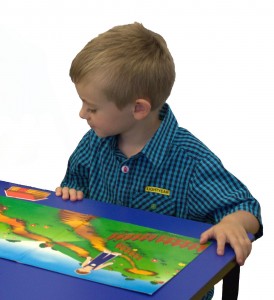
Previous blogs have looked at how children develop the ability to answer questions of increasing complexity. Level four is the most complex level of questions within this model and typically develops in the first year of school. At this level children talk about things which are more removed from what is directly in front of them. They need to reorganise information and draw on their experiences to predict, suggest solutions, solve problems, explain and justify decisions.
Level four questions include:
- predicting changes “What will happen if…”
- justifying “Why can’t you use a spoon to row a boat?”
- identifying causes “What made it happen”
- formulating a solution “What could you do?”
- problem solving “How could we fix it?”
- explanations “How can you tell he is sad? (because he is crying)
To help a child learn to answer questions:
- give lots of practice with one question type before moving on
- keep your questions short, clear and specific
- give only a few choices, two or three pictures or objects to start with, and add more as your child learns
If your child does not know the answer you can:
- Rephrase your question as a question from a simpler level then try the question again
- Give them a choice “Is it is this one or this one?”
- Model the answer then try another similar question.
Try these activities to practice level four questions:
Story book problems. Choose a book that is based around a problem and a series of possible solutions. Many picture books have this type of storyline. Start with a book your child is familiar with and one where they know the story quite well. Read a page or two then stop and ask your child “What will happen if?” Look at the next page and see what happens. Then ask your child “What made that happen?” Continue to read asking these questions now and then. When your child can do this with familiar stories try a new story and help them use cues from the story, the pictures and their own experiences to make predictions and explanations.
Feeling face explanations. Cut a number of pictures of faces from magazines or clip art. Look at each face and ask your child “How is he/she feeling?” then “How can you tell he/she is feeling that way?”. Talk about what your child can see in the picture that gives clues about feelings such as the person’s eyes and mouth. Then ask “What might have made them feel that way?” Try to draw ideas from the pictures, then try some funny reasons for their feelings. Ask “What could they do now?” and talk about ways to solve any problems they might have.
What is it made of? Put a range of different objects in a bag and ask your child to choose one. Ask them “What is it made of?” “Why is it made of that and not …?” For example a knife is made of metal and not paper because it needs to be strong and sharp so it can cut things.
What can I use? Put a range of objects from around the house in front of your child and ask “I need to…What can I use?” When your child chooses an appropriate object, chose another object and ask “Why couldn’t I use this?” For example to cut paper you need to use scissors and you would not use a toothbrush as it is not sharp and is for cleaning not cutting. Ask these questions as you do things around the house. “I need to cut this lettuce, what can I use, why can’t I use scissors?”
Not a good idea! Next time you tell your child not to do something see if they can explain to you why that is not a good idea. For example “Don’t walk with your muddy boots inside; why is that not a good idea?” If your child can explain they will learn and also may remember better next time.
Solving everyday problems. Next time your child asks for your help ask them “What could you do?” Try to come up with a few different ideas and talk about each one “Why would that work/not work?” Ask your child to choose the best solution and ask “Why would you choose that one?” Ask your child to help your solve some simple everyday problems as they occur.
Have fun practicing answering questions. If your child has difficulty with these tasks, see the Talking Matters website for how a speech pathology assessment may help.
Related posts:
All about questions
Questions for preschool
3 year old questions
Beginning questions
At school, now what?
Related Blog Posts
If you liked this post you may also like:
Speech Pathology 101
Sharing stories
Using new sounds
50 pre-writing tips



